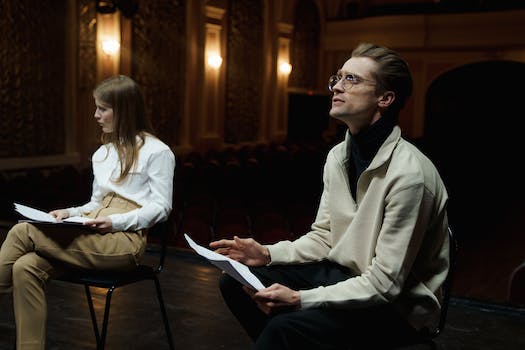B movie directors have been crucial contributors to the world of cinema, their rise and influence shaping the industry in unique ways. Despite often working with limited budgets and resources, these talented filmmakers have managed to captivate audiences with their innovative storytelling techniques and distinctive style. From cult classics to genre-defining masterpieces, the films of B movie directors have left an indelible mark on the history of cinema, challenging conventional norms and paving the way for future generations of filmmakers. In this article, we delve into the rise and influence of B movie directors, exploring their artistic vision and the lasting impact they have made on the film landscape.
- 1. Introduction
- 1.1. What is a B-movie?
- 1.2. Importance of B-movie directors
- 1.3. Why B-movie directors deserve recognition
- 1.4. Overview of B-movie directors
- 2. Notable B-movie Directors
- 2.1. Roger Corman
- 2.2. Ed Wood
- 2.3. Sam Raimi
- 2.4. Lloyd Kaufman
- 2.5. John Carpenter
- 3. Characteristics of B-movie Directing
1. Introduction
B movies have long been a prominent part of the film industry, often overshadowed by their big-budget blockbuster counterparts. However, within the world of B movies, there are directors who have managed to carve out a niche for themselves and make a significant impact on the genre. These B movie directors have not only risen to prominence but have also influenced the industry in various ways. From their unique storytelling techniques to their ability to work within limited budgets, these directors have proven that creativity and innovation can thrive even in the realm of low-budget filmmaking. In this article, we will explore the rise and influence of B movie directors and delve into the reasons behind their enduring popularity.
1.1. What is a B-movie?
A B-movie, also known as a low-budget movie, is a term used to describe a genre of films that are typically made with limited financial resources and production values. These movies are often characterized by their unconventional storytelling, exaggerated acting, and low-quality special effects. B-movies gained popularity in the mid-20th century and were usually shown as the second feature in a double feature screening. Although they were initially considered to be of lower quality compared to mainstream Hollywood productions, B-movies have developed a cult following over the years and have had a significant influence on the film industry.
1.2. Importance of B-movie directors
B-movie directors have played a significant role in shaping the film industry throughout history. Despite their often limited budgets and resources, these directors have proved to be influential in various ways. This article explores the importance of B-movie directors and their contributions to the world of cinema.
1.3. Why B-movie directors deserve recognition
B-movie directors often go unnoticed and underrated in the world of filmmaking. These directors, who specialize in low-budget and often quirky movies, deserve recognition for their unique contributions to the industry. While mainstream Hollywood films tend to dominate the spotlight, B-movie directors have played a significant role in shaping the evolution of cinema. This article will explore the rise and influence of B-movie directors, shedding light on their importance and impact on the film landscape.
1.4. Overview of B-movie directors
B-movie directors have played a crucial role in shaping the world of cinema. These directors, often working with low budgets and limited resources, have managed to create a unique style and niche within the film industry. This section will provide an overview of B-movie directors, exploring their rise to prominence and their influence on the filmmaking landscape.
B-movie directors are typically known for their ability to work within tight constraints and still deliver entertaining and engaging films. They often delve into genres such as horror, science fiction, and exploitation, where creativity and imagination can thrive. These directors embrace the challenges of low budgets and use innovative techniques to make the most of their resources.
One of the notable aspects of B-movie directors is their willingness to take risks and experiment with unconventional storytelling methods. They often push boundaries, both in terms of content and style, offering audiences a refreshing alternative to mainstream cinema. This willingness to think outside the box has allowed these directors to develop a dedicated following among fans of cult films.
Furthermore, B-movie directors have had a significant impact on the evolution of cinema. Their unique approach to filmmaking has influenced and inspired many renowned directors working in the industry today. From their innovative use of practical effects to their ability to create suspense and tension with limited resources, B-movie directors have contributed to the development of various filmmaking techniques.
In conclusion, B-movie directors have carved out a distinct space within the film industry, showcasing their creativity, resourcefulness, and willingness to take risks. Their rise to prominence and influence on the filmmaking landscape cannot be overlooked, as they continue to shape and inspire the world of cinema.
2. Notable B-movie Directors
B-movie directors have played a significant role in shaping the world of cinema. Despite working with lower budgets and limited resources, these directors have managed to create impactful and memorable films. Their unique style and approach have garnered a cult following and influenced the industry in various ways. Here are some notable B-movie directors who have left a lasting impact on the world of cinema:
1. Roger Corman: Known as the ‘King of the B-movies,’ Roger Corman has directed and produced over 400 films throughout his career. He is credited with launching the careers of numerous Hollywood legends, such as Francis Ford Coppola, Martin Scorsese, and James Cameron.
2. Ed Wood: Often referred to as the ‘worst director of all time,’ Ed Wood gained a cult following for his unconventional and eccentric films. His most famous work, ‘Plan 9 from Outer Space,’ is considered one of the worst movies ever made but has achieved cult status.
3. Russ Meyer: Recognized for his exploitation films, Russ Meyer’s provocative and controversial style set him apart from other directors. His films, such as ‘Faster, Pussycat! Kill! Kill!’ and ‘Beyond the Valley of the Dolls,’ challenged societal norms and pushed boundaries.
4. John Carpenter: While John Carpenter is primarily known for his horror films, he has also made significant contributions to the B-movie genre. Classics like ‘Halloween’ and ‘Escape from New York’ solidified his status as a master of suspense and helped shape the future of horror cinema.
5. Lloyd Kaufman: As the co-founder of Troma Entertainment, Lloyd Kaufman has become synonymous with B-movies. His films, including ‘The Toxic Avenger’ and ‘Tromeo and Juliet,’ have gained a dedicated fan base and showcase his unique blend of comedy, horror, and social commentary.
These are just a few examples of the many talented B-movie directors who have left an indelible mark on the film industry. Despite their often limited resources, they have managed to create films that continue to captivate audiences and inspire future generations of filmmakers.
2.1. Roger Corman
Roger Corman is a highly notable B-movie director who has had a significant impact on the film industry. Known as the ‘King of the B’s,’ Corman is renowned for his ability to produce low-budget films that still manage to captivate audiences. He has directed and produced over 400 films throughout his career, many of which have become cult classics.
Corman’s unique approach to filmmaking has made him a pioneer in the B-movie genre. He was able to create entertaining and imaginative movies while working with limited resources. His films often featured themes of horror, science fiction, and exploitation, and he was known for pushing the boundaries of what was considered acceptable in cinema.
Corman’s influence can be seen in the work of many successful filmmakers who started their careers under his guidance. Notable directors such as Martin Scorsese, Francis Ford Coppola, and James Cameron all credit Corman as a mentor and inspiration. His emphasis on creativity and resourcefulness has shaped the independent film industry and inspired generations of filmmakers.
Overall, Roger Corman’s contributions to the B-movie genre and the film industry as a whole cannot be underestimated. His ability to create compelling stories despite budget constraints and his influence on future generations of filmmakers make him a true icon in the world of cinema.
2.2. Ed Wood
Ed Wood was a notable B-movie director who gained a cult following for his unique and often eccentric filmmaking style. Wood was known for his low-budget productions, which often featured unconventional storylines, cheesy special effects, and questionable acting. Despite his films being critically panned during his lifetime, he has since become celebrated as one of the most iconic B-movie directors of all time.
Wood’s most famous work is undoubtedly the film ‘Plan 9 from Outer Space,’ which is often regarded as one of the worst movies ever made. Despite its flaws, the film has gained a dedicated fan base and has been praised for its unintentional humor and charmingly bad production values.
Wood’s influence on B-movie filmmaking cannot be overstated. His willingness to take risks and his passion for storytelling, regardless of budget constraints, inspired countless aspiring filmmakers. His unique approach to filmmaking, characterized by his love for the bizarre and his ability to create compelling narratives on shoestring budgets, has left a lasting impact on the genre.
Today, Ed Wood’s legacy continues to be celebrated by fans and filmmakers alike. His films may not have achieved critical acclaim during his lifetime, but they have found an enduring place in the hearts of B-movie enthusiasts. The enduring popularity of Wood’s work is a testament to the power of creativity and passion, proving that even in the realm of low-budget cinema, there is room for innovation and artistic expression.
2.3. Sam Raimi
Sam Raimi is a notable B-movie director known for his unique blend of horror and comedy. He rose to prominence with the 1981 cult classic ‘The Evil Dead’, which he wrote, directed, and produced. Raimi’s innovative use of low-budget techniques, such as the ‘shaky cam’ and inventive camera angles, brought a fresh and thrilling experience to the horror genre.
Raimi continued his success with the ‘Evil Dead’ franchise, releasing ‘Evil Dead II’ in 1987 and ‘Army of Darkness’ in 1992. These films further solidified his reputation as a master of B-movie horror.
In addition to his work in the horror genre, Raimi has also directed mainstream movies such as the superhero film ‘Spider-Man’ trilogy (2002-2007), which achieved massive commercial success. His ability to transition between different genres and maintain his unique style has made him a highly influential figure in the film industry.
Raimi’s impact on B-movie directors can be seen in the number of filmmakers who have cited him as an inspiration. His creative approach to storytelling and willingness to push boundaries have opened doors for aspiring directors to experiment with unconventional techniques and narratives. Whether it’s his horror films or big-budget blockbusters, Raimi’s contributions to the world of cinema are undeniable.
2.4. Lloyd Kaufman
Lloyd Kaufman is a highly notable B-movie director who has made a significant impact on the genre. With his unique vision and unapologetic approach, Kaufman has become synonymous with independent filmmaking and has developed a cult following. He co-founded Troma Entertainment, a production company known for its low-budget, high-energy films that push boundaries and challenge conventional storytelling. Kaufman’s most famous creation is undoubtedly the ‘Toxic Avenger’ franchise, which has achieved cult status and spawned multiple sequels. His films often tackle social issues with a satirical twist, incorporating elements of horror, comedy, and social commentary. Kaufman’s influence can be seen in the work of many contemporary directors, as his DIY ethos and rebellious spirit continue to inspire aspiring filmmakers around the world.
2.5. John Carpenter
John Carpenter is a highly regarded director in the world of B-movies. Known for his unique blend of horror, science fiction, and action, Carpenter has made a significant impact on the genre. He first gained recognition with his breakout film, ‘Halloween’ (1978), which became a cult classic and set the standard for slasher films. Carpenter continued to explore various subgenres within the B-movie realm, directing films like ‘The Thing’ (1982), ‘Escape from New York’ (1981), and ‘Big Trouble in Little China’ (1986). His distinct visual style and ability to create suspenseful atmospheres have made him a favorite among fans of B-movies. Despite working with limited budgets, Carpenter has consistently delivered entertaining and influential films that have left a lasting impact on the industry.
3. Characteristics of B-movie Directing
B-movie directing is a unique art form that requires a specific set of characteristics. These directors often work with limited budgets and resources, yet they still manage to create entertaining and memorable films. Here are some key characteristics of B-movie directing:
1. Creativity: B-movie directors need to be highly creative in order to make the most of their limited resources. They often come up with innovative solutions to budget constraints and find ways to make their films visually appealing.
2. Flexibility: B-movie directors must be flexible and adaptable, as they often face unexpected challenges during the filmmaking process. They need to think on their feet and make quick decisions to keep the production moving forward.
3. Passion: B-movie directors have a deep passion for filmmaking. Despite the limitations they may face, they are driven by their love for the craft and the desire to create unique and entertaining movies.
4. Vision: B-movie directors have a clear vision for their films. They know what they want to achieve and how to bring their ideas to life, even with limited resources. Their vision helps them overcome obstacles and create films that stand out.
5. Resourcefulness: B-movie directors excel at being resourceful. They know how to make the most of what they have, whether it’s finding affordable locations, using creative camera angles, or utilizing practical effects instead of expensive CGI.
6. Risk-taking: B-movie directors are not afraid to take risks. They are willing to experiment with unconventional storytelling techniques, unique visual styles, and offbeat concepts. This willingness to take risks often leads to the creation of cult classics.
These characteristics are what make B-movie directing a distinct and influential aspect of the film industry.
3.1. Low-budget filmmaking
Low-budget filmmaking is a challenging yet rewarding endeavor that allows filmmakers to showcase their creativity and passion without breaking the bank. B-movie directing, in particular, requires a unique set of skills and characteristics. These directors often work with limited resources and tight schedules, but they still manage to produce films that achieve a cult following and influence the industry. Here are some key characteristics of B-movie directing:
1. Resourcefulness: B-movie directors excel at making the most out of their limited budgets. They find creative solutions to overcome financial constraints and utilize their available resources effectively. Whether it’s borrowing props, using guerrilla filming techniques, or relying on practical effects, resourcefulness is paramount.
2. Versatility: B-movie directors wear multiple hats and take on various roles throughout the production process. They may write the screenplay, handle cinematography, edit the film, and even act in it. Being versatile allows them to have complete control over the creative vision and make the most of their limited resources.
3. Efficiency: With tight schedules and limited budgets, B-movie directors must work quickly and efficiently. They make decisions on the spot, adapt to unforeseen challenges, and prioritize essential elements of the film. Time management skills and the ability to think on their feet are crucial for successful B-movie directing.
4. Passion for genre: B-movie directors often have a deep love for specific genres, such as horror, science fiction, or exploitation. They understand the conventions and tropes of these genres and use them to their advantage. Their passion fuels their creativity and drives them to push boundaries, resulting in unique and captivating films.
5. Embracing imperfections: B-movie directors embrace the imperfections that come with low-budget filmmaking. They understand that their films may not have the same polished look or high production value as big-budget blockbusters. Instead, they embrace the charm and quirkiness that arise from these imperfections, making their films stand out and resonate with audiences.
In conclusion, B-movie directing requires a combination of resourcefulness, versatility, efficiency, genre knowledge, and a willingness to embrace imperfections. These characteristics enable directors to create captivating films on a low budget and leave a lasting impact on the industry.
3.2. Creative storytelling
Creative storytelling is an essential aspect of B-movie directing. B-movies are known for their low budgets and limited resources, which often require directors to rely on their creativity to deliver engaging narratives. These directors have a unique ability to transform simple and sometimes absurd storylines into captivating cinematic experiences.
Characteristics of B-movie directing involve a distinctive approach to storytelling. B-movie directors embrace unconventional and imaginative techniques to compensate for their limited resources. They often utilize clever plot twists, exaggerated characters, and unexpected developments to keep the audience entertained. This style of directing allows for a more experimental and freer form of storytelling, where filmmakers can push the boundaries of traditional narratives.
B-movie directors also possess a knack for creating compelling and memorable characters. They understand the importance of larger-than-life personalities that can captivate the audience. These directors often cast actors who can bring their unique charm and charisma to the screen, elevating the overall quality of the movie.
In addition, B-movie directing is characterized by its ability to create suspense and tension despite the constraints of limited budgets. Directors employ innovative techniques, such as creative camera angles, atmospheric lighting, and clever editing, to build a sense of anticipation and excitement. By skillfully utilizing these elements, B-movie directors can create a thrilling experience for the audience.
Overall, the characteristics of B-movie directing revolve around creative storytelling, unconventional techniques, memorable characters, and the ability to generate suspense despite limited resources. These directors have made a significant impact on the film industry, influencing contemporary filmmakers and shaping the unique charm of B-movies.
3.3. Inventive use of resources
B-movie directors have always been known for their inventive use of resources. With limited budgets and resources, these directors have to think outside the box to create visually appealing and entertaining films. One characteristic of B-movie directing is the ability to make the most out of available resources. Whether it’s using household items as props or shooting in unconventional locations, B-movie directors excel at finding creative solutions to production challenges.
Another characteristic of B-movie directing is the emphasis on storytelling and creativity over technical perfection. B-movies often prioritize unique and imaginative storylines over high production values. Directors in this genre are not afraid to take risks and experiment with different storytelling techniques. They understand that it’s the story and the characters that captivate the audience, not necessarily the visual effects or expensive sets.
Furthermore, B-movie directors are masters of improvisation. They are skilled at adapting to unexpected circumstances and making the best of it. Whether it’s rewriting scenes on the spot or incorporating unplanned elements into the film, these directors know how to think on their feet and turn limitations into opportunities.
In conclusion, B-movie directors possess a unique set of characteristics that allow them to overcome resource constraints and deliver captivating films. Their inventive use of resources, focus on storytelling, and ability to improvise set them apart from other directors in the industry.
3.4. Emphasis on entertainment value
B-movie directing is a unique and often misunderstood art form that has had a significant impact on the world of cinema. One of the defining characteristics of B-movie directing is the emphasis on entertainment value. Unlike mainstream Hollywood films that often prioritize high production values and complex narratives, B-movie directors focus on creating movies that are entertaining and enjoyable to watch. They understand that their target audience is looking for a fun and thrilling experience, and they deliver just that.
B-movie directors excel at infusing their films with a sense of excitement and escapism. They know how to grab the audience’s attention from the very beginning and keep them engaged throughout the entire movie. Whether it’s through over-the-top action sequences, cheesy dialogue, or outlandish plot twists, B-movie directors know how to create an entertaining experience that leaves a lasting impression.
Another characteristic of B-movie directing is the willingness to take risks and experiment with unconventional storytelling techniques. B-movies are known for their low budgets, which often means that directors have to get creative with their resources. This leads to unique and sometimes bizarre choices in terms of cinematography, editing, and special effects. B-movie directors are not afraid to try something new and push the boundaries of what is considered traditional filmmaking.
In addition, B-movie directors often have a deep love and appreciation for the genre they work in. They are well-versed in the history of B-movies and draw inspiration from the classics that came before them. This passion shines through in their work and adds an extra layer of authenticity to their films.
Overall, B-movie directing is a distinct style of filmmaking that prioritizes entertainment value above all else. It is a genre that allows directors to unleash their creativity and take risks, resulting in movies that are uniquely enjoyable and captivating.
3.5. Risk-taking and experimentation
Risk-taking and experimentation are key characteristics of B-movie directing. B-movie directors often push the boundaries of traditional filmmaking by embracing unconventional storytelling techniques, exploring controversial themes, and utilizing low-budget production methods. These directors are not afraid to take risks and deviate from mainstream norms in order to create unique and compelling films. Their willingness to experiment with different styles, narratives, and visual aesthetics sets them apart from other directors in the industry. By embracing risk-taking and experimentation, B-movie directors have been able to make a significant impact on the world of cinema, influencing future generations of filmmakers.
Conclusion
In conclusion, B movie directors have experienced a significant rise in popularity and influence in recent years. Their ability to create unique and unconventional films has captivated audiences and provided them with an alternative to mainstream cinema. These directors have proven that creativity and passion can shine, even with limited budgets and resources. As they continue to push boundaries and challenge traditional filmmaking norms, their impact on the industry is likely to grow even further.




